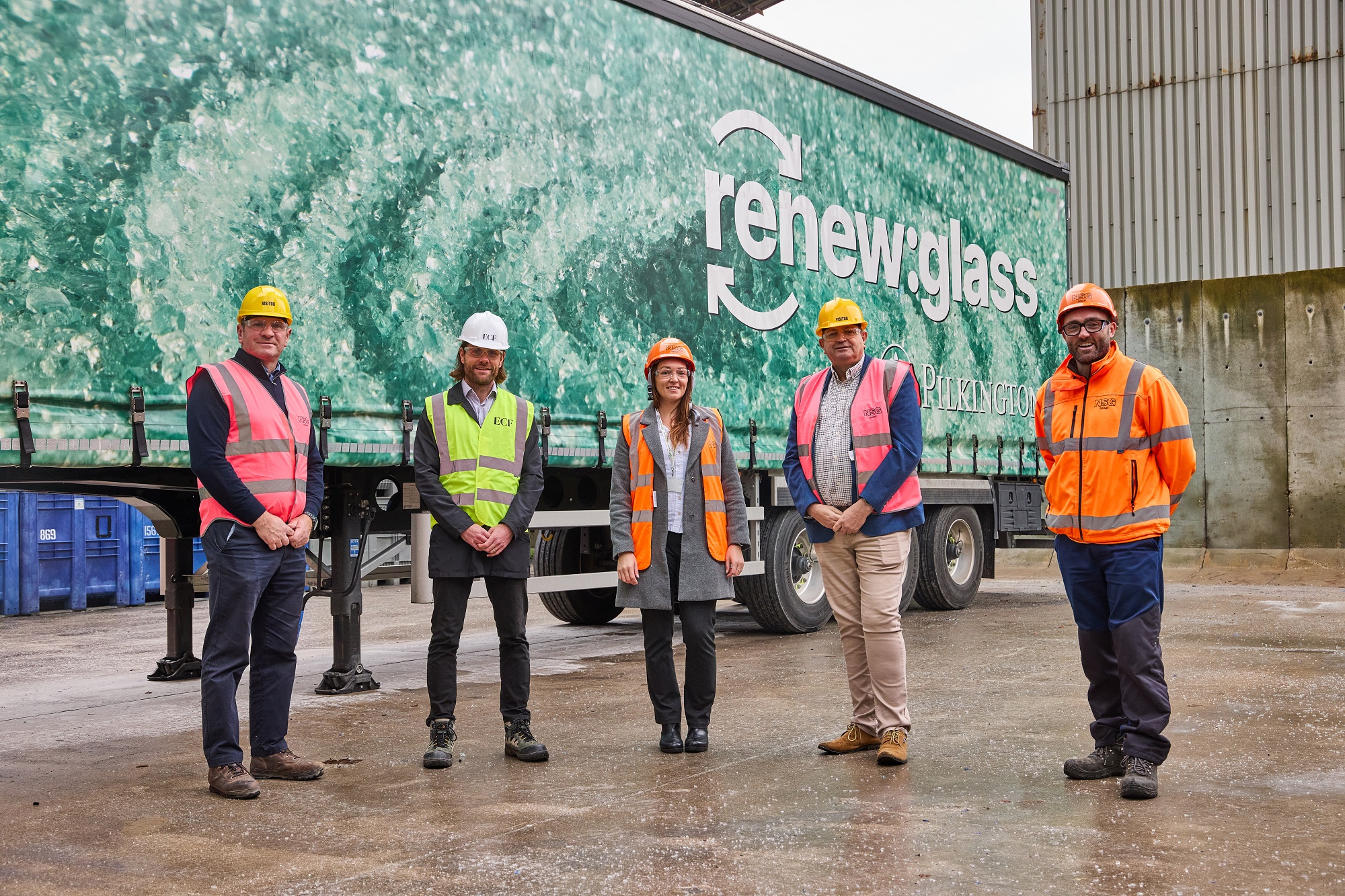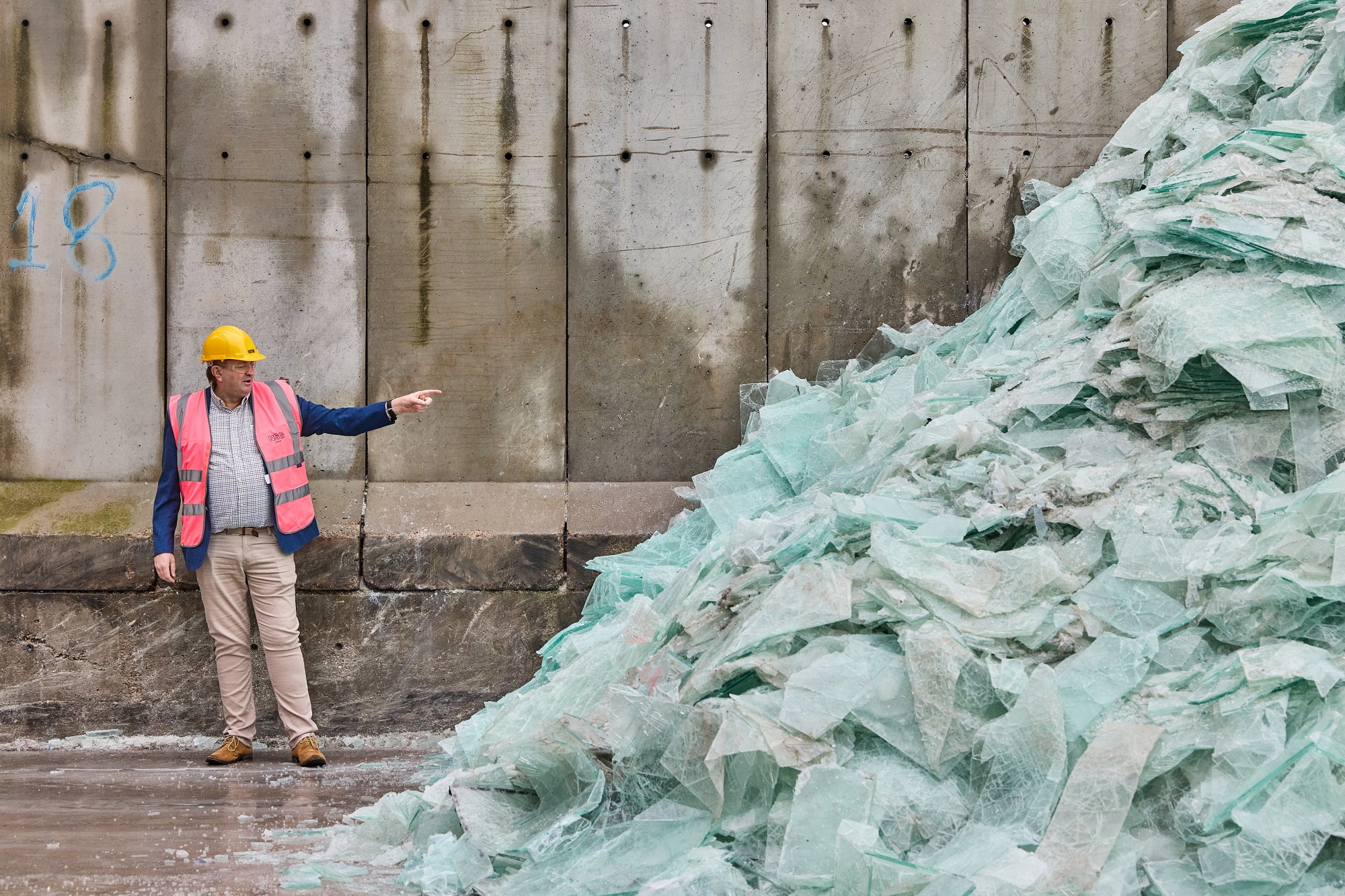Pilkington UK brings end-of-life glass recycling to St Helens town centre regeneration initiative
 Pictured L-R Chris Bishop from Muse, Bae Roberts from Pilkington, Martin Horton from VINCI Building, Cllr Richard McCauley and Jordan Case from Pilkington
Pictured L-R Chris Bishop from Muse, Bae Roberts from Pilkington, Martin Horton from VINCI Building, Cllr Richard McCauley and Jordan Case from Pilkington
Pilkington United Kingdom Limited, part of the NSG Group, has helped to lower carbon and reduce waste in the once-in-a-generation regeneration of St Helens town centre, by recovering glass from former buildings and recycling it for new and retrofitted buildings in the first phase development.
Working alongside the main contractor, VINCI Building, which is delivering the scheme on behalf of St Helens Borough Council and its regeneration partner ECF – a venture between Homes England, Muse and L&G, the firm recovered 7.34 tonnes of glass from buildings being demolished as part of the town’s transformation. The amount is roughly the same as the annual glass recycling of 150 average households.
Instead of going to landfill, the glass has been melted down and used to create new float glass, a process that saved 5.13 tonnes of CO₂e emissions, along with 8.8 tonnes of virgin raw materials.
The glass was recovered from two key sites being cleared in the town centre: the Hardshaw Centre, St Helens’ shopping centre which stood for 40 years, and the town’s main bus station as part of early regenerative work. Demolition contractor Bradley Group supported the project by collecting and removing the glass from site, while Pilkington UK assessed the glass, advised on its removal, and coordinated the processing for re-use.
Pilkington UK recycled the glass via its renew:glass scheme, which aims to increase the amount of flat glass that is recycled. The glass is sorted and processed into cullet, small fragments that can be melted down more efficiently. This reduces construction waste and lowers the carbon footprint of the glass manufacturing process. The initiative highlights how collaboration between industry and local authorities can deliver practical environmental outcomes.
The work also supports NSG Group’s Science Based Targets Initiative, which outlines the company’s commitment to lowering greenhouse gas emissions by 30% by 2030 and achieve carbon neutrality by 2050.
Bea Roberts, Specification Manager, said: “This project is as much about protecting our future as it is about honouring our past. By reusing and recycling glass, we’re cutting waste and building a more sustainable town centre. This circular practical approach puts sustainability at the heart of regeneration, helping us to build a cleaner future for our industry and local community.”
Councillor Richard McCauley, Cabinet Member for Regeneration at St Helens Borough Council, said: “As a council committed to making waste a thing of the past and reaching net zero by 2040, we’re proud to see glass recycled, not discarded, as part of the town’s regeneration programme. By diverting materials from landfill and incorporating them into new developments, we are moving together to convert sustainability from ambition to action. Moreover, we are incredibly proud to be working with Pilkington UK on this initiative given the company was founded here in St Helens and it continues to revolutionise industry so positively.”

Pictured L-R Martin Horton from VINCI Building, Chris Bishop from Muse, Bae Roberts from Pilkington, Cllr Richard McCauley and Jordan Case from Pilkington
Matt Whiteley, Senior Development Manager for ECF, commented “Our ambition for this transformational scheme regeneration is not only to revitalise St Helens town centre, but to do so in a way that sets new standards for sustainability. Achieving our target of reusing 98% of materials on site is central to that vision. The recovery and recycling of glass by Pilkington UK is a perfect example of how collaboration can reduce waste, cut carbon and create a truly circular approach to development. Together, we’re showing how regeneration can honour the past while building a resilient, sustainable future for the people of St Helens.”
The transformation of St Helens will include a new Market Hall, a 120-bedroom Hampton by Hilton hotel, 56 apartments and eight townhouses. All of this will sit within expansive, biodiversity-rich green spaces designed to support pollinators, encourage native planting, and improve climate resilience. Backed by a £69.2 million funding package from St Helens Borough Council, this element of the project also benefits from UK Government support, including £7.24 million for the Phase One of the development through the Town Deal and £0.812 million from the One Public Estate Brownfield Land Release Fund to enable new housing
The borough is also set to benefit from a St Helens Transport Interchange project that is being supported by a £32 million investment from the Liverpool City Region Combined Authority via the City Region Sustainable Transport Settlement (CRSTS), along with £3.25 million from the UK Government’s Towns Fund and further contributions from St Helens Borough Council.


